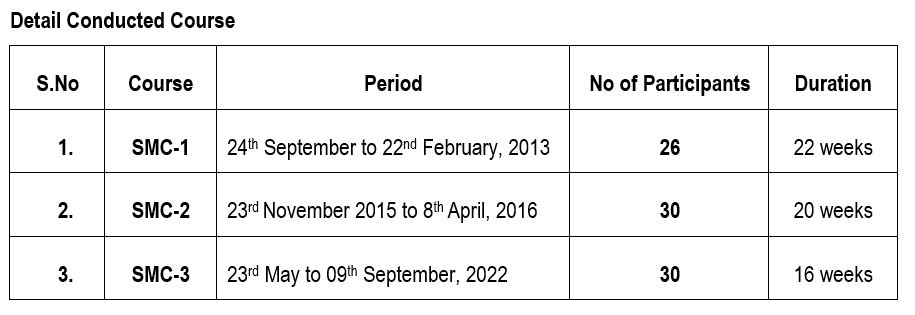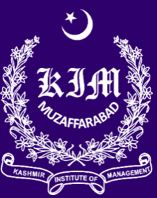SENIOR MANAGEMENT COURSE (SMC):
As per new promotion policy of the Government of AJ&K, this is a compulsory training course for the BPS-20 officers of the Govt. departments to be eligible for consideration for elevation as secretary to the Government. At present, it has also been declared mandatory by change in the rules for promotion to BPS-20, for the officers of Management Group, Secretariat Group and Police Department of the Govt. of AJ&K, SMC by design should have weightage in the career path of the officers. The course has been designed to train potential B-20 officers to improve their on-the-job-performance.
Essentially the focus of the course is on the following:
- Improve / enhance KSAA i.e. Knowledge, Skills, Abilities and Attitudes of the participants so as to enable them to plan, implement and supervise Public Sector programs and Projects effectively and efficiently.
- Sensitize them in the public interest and groom and retain public trust through improved efficiently and service delivery.
- It is all about self-learning, self-management and self-discovery.
AIM:
Participants are expected to acquire the principal core competencies of evidence based decision making and problem solving to contribute significantly to the following:
- Assisting Evidence Based Policy Formulation
- Strategizing Policy Implementation
- Analyzing Qualitative and Quantitative Data / Information
- Managing all Resources (Tangible & Intangible) Team Building
SCOPE:
- Familiarize the participants with the national environment so as to understand the interplay of external and internal dynamics and their influence on governance in Pakistan
- Develop participants’ understanding of the diversity in Pakistani society (socio-cultural values, beliefs and attitudes) and its relevance to policy implementation and governance
- Provide in-depth knowledge of governance and administrative structures of Pakistan along with relevant policy processes and implementation strategies
- Enable the participants to apply concepts and techniques of management, operational and technical implementation in the Pakistani environment
- Enhance participants’ comprehension about operationalizing strategy
- Equip participants with evidence based research and analytical skills for enhanced performance on the job
- Through workshops, seminars and other group activities, enhance capacity of the participants in the use of Information & Communication Technology and making it an effective tool of analysis, interpretation, decision making and monitoring
- Through study tours, expose the participants to issues and practical problems of the Pakistani society and state along with impact of various policies and management practices on the people of Pakistan
- Facilitate participants’ good health and introduce variety in their course routine through co-curricular activities and sports
EXPECTED OUTCOMES OF SMC:
For better Public Service delivery, Participants should acquire following four core capabilities:
- Strategizing Policy implementation.
- Qualitative and Quantitative analysis of data / information.
- Manage all resources (tangible & intangible including knowledge)
- Team work.
TRAINING MODULES AND CONDUCT:
- The curriculum of the Course comprises seven study modules spread over 3 terms as under:
Module – 1: National Environment: Internal and External Dynamics (NE: I & ED)
Module – 2: Impact of Diversity and Evolution of Pakistani Society on Administration and Service Delivery (ID&EPSA&SD)
Module – 3: Economic and Financial Management at Operational Level (E&FM OL)
Module – 4: Issues of Operational Effectiveness within Governance Framework (IOE &GF)
Module – 5: Research Methodology & Its Application (RM&A)
Module – 6: Study Tours: Field Research (ST: FR)
Module – 7: Information & Communication Technology (ICT)
- b) Each module is sponsored by a faculty member, who is responsible for organizing and conducting it in accordance with the curriculum under the overall supervision of NSPP.
- Sessions are generally held centrally in the Shahzad Arbab Hall. Scholars and eminent speakers, who are experts in their specific fields, are invited to deliver talks on given topics, which are followed by Q&A sessions.


